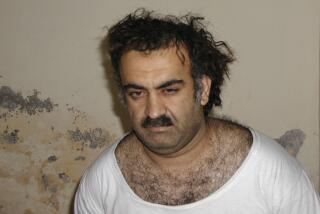Moussaoui Tries to Plead Guilty Again
WASHINGTON â Zacarias Moussaoui, accused of conspiring with Al Qaeda in the Sept. 11 terrorist attacks, has said in a letter to federal prosecutors and a U.S. District Court judge that he wants to plead guilty and accept the death penalty, sources close to the case said Monday night.
The one-page letter, which Moussaoui sent from his jail cell two weeks ago, comes after federal prosecutors and his defense attorneys seemed at last to be on track toward a trial date sometime late this fall or in January. His trial has been stalled in the courts for more than three years.
Instead, U.S. District Judge Leonie M. Brinkema has told the lawyers that she wants to meet with the French citizen at the federal courthouse in Alexandria, Va., before deciding how to proceed.
A spokesman for Paul McNulty, the U.S. attorney for the Eastern District of Virginia, where Moussaouiâs case was filed, declined to comment, as did a spokesman for the Justice Department.
Moussaouiâs mental competence has been at issue since shortly after his indictment in December 2001.
He initially pleaded not guilty, then tried to plead guilty, and later wanted to represent himself before what he called a âdeath jury.â The judge gave him a week to reconsider the latter request.
He withdrew his guilty plea and wrote his own legal briefs to the court, sharply chastising, ridiculing and even threatening the judge, prosecutors and his defense team, led by federal public defender Frank W. Dunham Jr.
Sources said that Moussaouiâs lawyers wanted his latest request thrown out, arguing that the letter is Moussaouiâs naive attempt to win a hearing before the U.S. Supreme Court.
The government has long believed that 20 people were meant to hijack the four jetliners on Sept. 11, although only 19 boarded the planes that morning. Moussaoui, who has admitted being a member of Al Qaeda, was first viewed as the possible 20th hijacker.
But prosecutors, along with the independent government commission that investigated the attacks, have dropped that identification of Moussaoui.
They now suggest that the Sept. 11 planners believed him too unstable to join the hijackers on the planes that crashed into the World Trade Center, the Pentagon and a southwestern Pennsylvania field.
Moussaoui was arrested in August 2001 after a flight instructor in Minnesota alerted the FBI to what appeared to be suspicious behavior.
He was in federal custody on immigration charges when the attacks occurred; after Sept. 11, he was taken to the Washington area and indicted on six counts of conspiracy in the plot. Four of the counts carry the death penalty.
His case is the only one related to the attacks that has come close to going to trial, and the Bush administration has viewed it as a key prize in its war on terrorism.
The administration has been steadfast in its desire to bring Moussaoui to trial and has wanted a conviction with the death penalty to show the consequences of such an attack on the United States.
Sources said Monday night that Moussaouiâs offer, on its face, would give the government what it wants -- an execution.
The question, though, is whether Moussaoui is mentally competent and, even so, whether he should be taken seriously, given his attempt in July 2002 to plead guilty, only to change his mind.
As one source close to the case, who asked not to be identified because much of the criminal case is under seal, said: âThere will be no plea unless [the judge] knows for sure that heâs serious and that itâs going to go down like this.â
The source added that like many of Moussaouiâs other ramblings and rantings to the court, which Brinkema has warned him to stop, this offer to plead guilty and take the death penalty âdoesnât make a lot of sense either.â
In other legal pleadings, Moussaoui has admitted that he is a member of Al Qaeda, but he also has maintained that he had no role in the planning of the Sept. 11 attacks.
He has sought to question three alleged Al Qaeda members, including Khalid Shaikh Mohammed, whom authorities consider to be the mastermind of the Sept. 11 plot. Moussaoui says they would support his contention that he was not involved in the plot.
But the Supreme Court last month rejected his efforts to interrogate the men in U.S. custody, supporting the governmentâs contention that the prisoners were intelligence assets and that any questioning of them would compromise national security.
More to Read
Sign up for Essential California
The most important California stories and recommendations in your inbox every morning.
You may occasionally receive promotional content from the Los Angeles Times.











